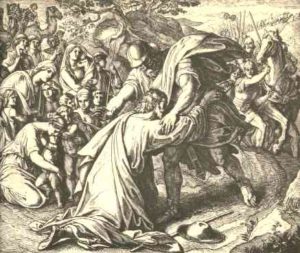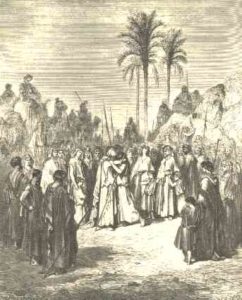Outline
The friendly meeting of Jacob and Esau. (Verse 1-16.)
Jacob comes to Succoth and Shalem, He builds an altar. (Verse 17-20.)
1 And Jacob lifted up his eyes, and looked, and, behold, Esau came, and with him four hundred men. And he divided the children unto Leah, and unto Rachel, and unto the two handmaids.
in spite of his prayer and later encounter with an angel, Jacob still trusts his own brain more than God and continues with his efforts to protect himself and his family from Esau
2 And he put the handmaids and their children foremost, and Leah and her children after, and Rachel and Joseph hindermost.
3 And he passed over before them, and bowed himself to the ground seven times, until he came near to his brother.

4 And Esau ran to meet him, and embraced him, and fell on his neck, and kissed him: and they wept.
[Gen 29:11, Gen 45:15, 1st Cor 16:20, 2nd Cor 13:12, 1st Peter 5:14]
This must have enraged Leah Jacob’s first wife and her adult children. It would later come back to haunt Joseph the favored son of Jacob’s favorite wife.

5 And he lifted up his eyes, and saw the women and the children; and said, Who are those with thee? And he said, The children which God hath graciously given thy servant.
6 Then the handmaidens came near, they and their children, and they bowed themselves.
7 And Leah also with her children came near, and bowed themselves: and after came Joseph near and Rachel, and they bowed themselves.
8 And he said, What meanest thou by all this drove which I met? And he said, These are to find grace in the sight of my lord.
[Gen 21:29]
9 And Esau said, I have enough, my brother; keep that thou hast unto thyself.
10 And Jacob said, Nay, I pray thee, if now I have found grace in thy sight, then receive my present at my hand: for therefore I have seen thy face, as though I had seen the face of God, and thou wast pleased with me.
11 Take, I pray thee, my blessing that is brought to thee; because God hath dealt graciously with me, and because I have enough. And he urged him, and he took it.
12 And he said, Let us take our journey, and let us go, and I will go before thee.
13 And he said unto him, My lord knoweth that the children are tender, and the flocks and herds with young are with me: and if men should overdrive them one day, all the flock will die.
14 Let my lord, I pray thee, pass over before his servant: and I will lead on softly, according as the cattle that goeth before me and the children be able to endure, until I come unto my lord unto Seir.
[Gen 32:3, Deut 2:5, Josh 24:4]
“unto Seir” – Seir was where Esau was; Jacob had no intentions of going to Seir and merely said this to appease his brother; Jacob instead goes to Succoth (v. 17) which is 210 km. from Seir.
15 And Esau said, Let me now leave with thee some of the folk that are with me. And he said, What needeth it? let me find grace in the sight of my lord.
16 So Esau returned that day on his way unto Seir.
17 And Jacob journeyed to Succoth, and built him an house, and made booths for his cattle: therefore the name of the place is called Succoth.
[Josh 13:27]
[Succoth = booths, huts]
18 And Jacob came to Shalem, a city of Shechem, which is in the land of Canaan, when he came from Padanaram; and pitched his tent before the city.
[John 3:23]
19 And he bought a parcel of a field, where he had spread his tent, at the hand of the children of Hamor, Shechem’s father, for an hundred pieces of money.
[Josh 24:32]
20 And he erected there an altar, and called it Elelohe-Israel.
“El-elohe-Israel” means “God, the God of Israel”
Notice that Jacob went to Succoth instead of Bethel where God told him to go. This is just another example of Jacob obeying God in his own time in his own way.
The name of this place was called Succoth which means booths. This City is named after Israel’s wandering in the wilderness. During their wanderings, they slept in booths.
Commentary by Matthew Henry, 1710.
Verse 1-16 – Jacob, having by prayer committed his case to God, went on his way. Come what will, nothing can come amiss to him whose heart is fixed, trusting in God. Jacob bowed to Esau. A humble, submissive behaviour goes far towards turning away wrath. Esau embraced Jacob. God has the hearts of all men in his hands, and can turn them when and how he pleases. It is not in vain to trust in God, and to call upon him in the day of trouble. And when a man’s ways please the Lord he maketh even his enemies to be at peace with him. Esau receives Jacob as a brother, and much tenderness passes between them. Esau asks, Who are those with thee? To this common question, Jacob spoke like himself, like a man whose eyes are ever directed towards the Lord. Jacob urged Esau, though his fear was over, and he took his present. It is well when men’s religion makes them generous, free-hearted, and open-handed. But Jacob declined Esau’s offer to accompany him. It is not desirable to be too intimate with superior ungodly relations, who will expect us to join in their vanities, or at least to wink at them, though they blame, and perhaps mock at, our religion. Such will either be a snare to us, or offended with us. We shall venture the loss of all things, rather than endanger our souls, if we know their value; rather than renounce Christ, if we truly love him. And let Jacob’s care and tender attention to his family and flocks remind us of the good Shepherd of our souls, who gathers the lambs with his arm, and carries them in his bosom, and gently leads those that are with young, Isaiah 40:11. As parents, teachers or pastors, we should all follow his example.
Verse 17-20 – Jacob did not content himself with words of thanks for God’s favour to him, but gave real thanks. Also he kept up religion, and the worship of God in his family. Where we have a tent, God must have an altar. Jacob dedicated this altar to the honour of El-elohe-Israel, God, the God of Israel; to the honour of God, the only living and true God; and to the honour of the God of Israel, as a God in covenant with him. Israel’s God is Israel’s glory. Blessed be his name, he is still the mighty God, the God of Israel. May we praise his name, and rejoice in his love, through our pilgrimage here on earth, and for ever in the heavenly Canaa
